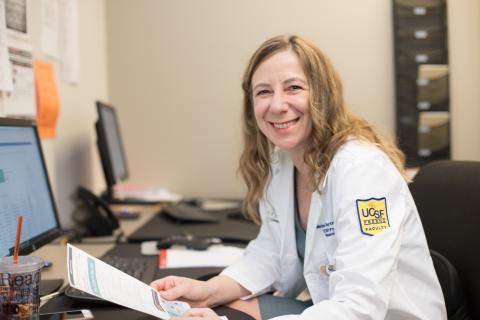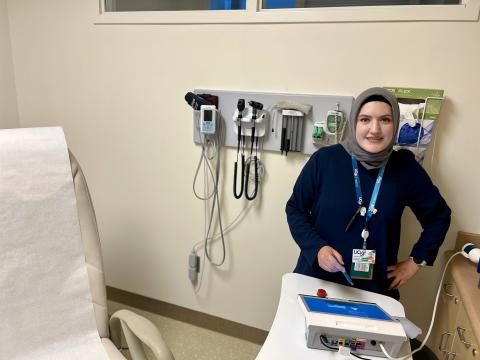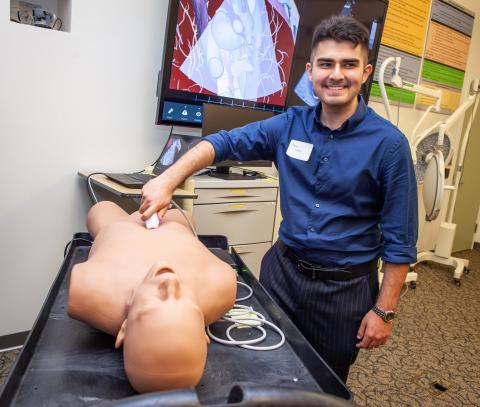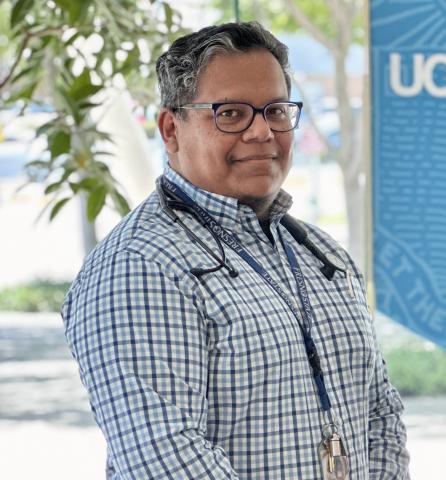
At UCSF Fresno, the Hepatology Fellowship Program introduces fellows to inpatient and outpatient management of patients with a wide range of acute and chronic liver diseases.
Marina Roytman, MD, Liver Program Director at UCSF Fresno, teaches hepatology to gastroenterology fellows, internal medicine residents, medical students and advanced practice providers. One of her academic interests includes viral hepatitis.
“I love to teach which is one of the main reasons that I am at UCSF Fresno. I give lectures on a variety of liver disease topics including viral hepatitis B and C to medical students, residents, fellows and advance practice providers,” said Dr. Roytman. “I try to cast as wide of a net as possible to educate the clinicians who will potentially be in the situation of being able to diagnose and treat the patient.”
Prevalence of liver disease is increasing in the U.S. population in general and in young people in particular due to an increase in obesity, metabolic risk factors, alcohol misuse disorder, and an opioid epidemic. Therefore, it is critical for all physicians to be familiar and comfortable diagnosing and taking care of patients with liver disease.
Jennifer Yoon, MD, is a second-year gastroenterology fellow who previously completed the hepatology fellowship. The program exceeded her expectations by providing and enriching the learning environment, exposure to clinical skills and significant involvement in patient care.
“The experience as a hepatology fellow is impactful and rewarding. You work with a lot of patients in the Central Valley, and there’s just a lot of learning that happens,” said Dr. Yoon.
Fellows gain a broad knowledge of the physiology of the liver and a thorough knowledge of the management of patients with hepatobiliary diseases. Dr. Roytman said they are exposed to didactic lectures, case conferences, tumor board meetings, selected readings, and clinical experience that jointly cover all areas.
Through their research, Dr. Roytman, residents and fellows found that alcohol related hepatitis increased during the COVID-19 pandemic in 2020. In 2021, they published an article on their research findings, The Pandemic Within the Pandemic.
There is a large body of evidence that shows an increasing rate of chronic hepatitis C as the consequence of the ongoing crisis. “The goal is to diagnose hepatitis C early because we now have a true cure for it. Once diagnosed with hepatitis C through a blood test, the patient will be prescribed medication to take from eight to 12 weeks and amazingly and remarkably be cured of hepatitis C,” said Dr. Roytman.
Dr. Yoon is grateful to be learning from attendings (faculty members), including Dr. Roytman who she says is incredibly involved in the hepatology fellow's education.
“There is a lot of pathology here, so there’s so much opportunity to learn here and I’m definitely grateful that I went through the hepatology program,” said Dr. Yoon. “As a GI fellow, I think I am definitely using all of the information and all of the skills that I acquired as a hepatology fellow.”
The UCSF Fresno Hepatology Fellowship was established in 2022 and is a one-year program within the Department of Internal Medicine that accepts one fellow per year.
In addition to teaching fellows, residents and students, Dr. Roytman started the UCSF Fresno Liver Expo, a free event for the community to learn about liver health through lectures, health screenings and other activities. This year's event will take place on Saturday, Oct. 12, 2024, in person at UCSF Fresno and via Zoom webinar.
UCSF Professor William J. Dominic, MD, a surgeon who made indelible contributions to burn care in the San Joaquin Valley, retired this summer after 32 years on the faculty at UCSF Fresno in the Department of Surgery.
In three decades at UCSF Fresno, he elevated the standard of burn care to levels recognized nationally, said Sandra Yovino Cramolini, RN, who retired five years ago as nursing director of burn services at the Leon S. Peters Burn Center at Community Regional Medical Center (CRMC).
“He put the Fresno burn center on the map,” Cramolini said.
With a 10-bed inpatient unit, the burn center is one of California's 12 regional burn centers. During Dr. Dominic’s tenure, the burn center received verification from the American Burn Association. The association assesses the standard of care from multiple angles, from acute care surgery to reconstruction, burn grafting outcomes, length of hospital stays – and even how well patients reintegrate into their communities.
“Verification is truly a stamp of honor,” said Nicole Kopari, MD, FACS, a UCSF professor of surgery at UCSF Fresno and Inspire Health Group surgeon who replaced Dr. Dominic as director of the burn center at CRMC. “It means we provide not only the highest standard of surgical care but throughout the continuum of their care.” In addition to acute care burn services, the Leon S. Peters Burn Center is known for offering reconstructive and scar modulation, which is unique to the burn center, she said. “We are also very well-known nationwide for providing excellent after-care for our patients.”
Dr. Dominic credits the team of nurses, technicians and support staff for the high standard of patient care. He built the team, showing an immediate interest in the staff when he became director in 1992, said Cramolini. “I was not in management when he came on board, but I was an educator for the burn center, and he really believed in that team process.”
The burn team has grown to include a nutritionist, a dedicated pharmacist, a child life specialist, a dedicated social worker, and a physical therapist.
Cramolini recalled a time when Dr. Dominic and the team were tested during a gas explosion that brought seven burn survivors at one time to the center. “It was 5 p.m. on a Friday, and we just all came together as a team,” she said. “It just flowed ... it was just seamless.”
Working together, Dr. Dominic and Cramolini were instrumental in designing the burn center at CRMC, which includes 10 private inpatient beds, a dedicated operating room, and a four-room outpatient clinic. “We wanted the center to all be concentrated in one area,” Dr. Dominic said. “We didn’t want to have to walk or take our patients long distances to the operating room or go back between the inpatient side and the clinic side.”
The Leon S. Peters Burn Center is larger than the burn center Dr. Dominic came to run in 1992 at the long-closed Valley Medical Center (VMC) in Fresno. At VMC, the operating room for burn-injured patients was in the old tuberculosis ward, and patients stayed in a multi-bed unit. “We didn’t have a lot of space, but we were pretty busy,” Dr. Dominic said.
Dr. Dominic, was the right surgeon to develop the burn center, said James Davis, MD, FACS, a UCSF professor of surgery at UCSF Fresno, chief of the UCSF Fresno Department of Surgery and an Inspire Health Group surgeon. He had known Dr. Dominic since 1986 when the two surgeons were in fellowship programs at UC San Diego, and he called Dr. Dominic when the burn center's directorship became available in 1992.
“He is a dedicated, dedicated surgeon,” Dr. Davis said of his longtime colleague and friend.
When he arrived at UCSF Fresno in 1992, Dr. Dominic recalled that he and his wife, Susan Dominic, MD, an Internal Medicine physician, thought they would stay five years. They soon enjoyed living in Fresno, near mountains and the Pacific Ocean, and Dr. Dominic found that what drew him to UCSF Fresno – the chance to oversee a burn center and teach surgical residents – sustained him.
“I had done extensive training in burns and trauma and critical care, and I was very excited about having a burn center to run at an early point in my career,” he said. “And I got to teach residents. It was sort of the job I would have designed for myself if I had a chance to do that.”
As a regional campus of the UCSF School of Medicine, UCSF Fresno trains medical students, residents and fellows through a network of affiliated partners, including Community Health System, VA Central California Health Care, Inspire Health and Family Healthcare Network.
“Every year, another crop of residents comes through and you become invested in trying to help their education. And it’s a very rewarding part of what we do,” Dr. Dominic said. “I’ve probably been involved in the training of somewhere around 160 surgeons in the last 30 years – residents and fellows – who are now out there practicing, many of them in the Valley.”
“We were very, very lucky to have him,” Cramolini said of Dr. Dominic’s decision to come to Fresno.
She said Dr. Dominic’s expertise as a surgeon is matched by his commitment to each burn-injured patient and his ability to communicate with their families. “I think what stands out is his passion for his patients. He had probably one of the best relationships with families. The ability to be straightforward with families, listen to their concerns, and spend as much time as needed with them.”
His connection with patients was recognized this past November when he received a 2023 Lifetime Achievement Award from the Fresno Madera Medical Society.
One of his patients spoke of his compassion in a video to honor Dr. Dominic. “He brought not just myself, but to my wife and family and friends – hope,” said Pete Dern, a Fresno fire captain, who had burns over 70% of his body after falling through a roof fighting a house fire in 2015.
Dern feared he would never walk again, but through surgeries and encouragement, Dr. Dominic helped him overcome anxiety. “I was pretty scared of what I couldn’t do,” Dern said. “To this day, I still, when I do something that I thought was gone, I send him a text or message. I just want him to know I’m thinking of him when I accomplish something.” For example, Dern said he and his daughter had just hiked Half Dome in Yosemite National Park.
Burn-injured patients have been an inspiration, Dr. Dominic said. For the past year, he considered each operation a privilege he should acknowledge.
“The ability, the necessity, of invading somebody else’s body in order to do something for them is not something many people experience. And so, I think it’s really important for me, as a surgeon, to understand what a privilege that is,” he said. “So, every time I operate now, I give a thought to the fact that it is a great privilege. Something I should really savor.”
Dr. Dominic’s commitment to burn survivors and to the community is to be respected and carried forward, Dr. Kopari said. “It’s important for us to continue his legacy of taking care of these burn survivors as part of our family and part of our community,” she said. “It’s continuing that standard of care and with our goal of focusing on patient outcomes and never compromising on excellent care.”

As a regional campus of the UCSF School of Medicine, research is a cornerstone of UCSF Fresno. UCSF Fresno’s research priorities focus on addressing health conditions pertinent to the San Joaquin Valley and central California and on bringing new treatments to the region such as through clinical trials. The UCSF Fresno Clinical Research Center (CRC) is currently recruiting study participants for three new clinical trials involving viral lung infections and progressive lung disease.
Clinical trials are research studies aimed at determining the effectiveness and safety of new medications, treatments and therapies. These studies offer several benefits including access to the latest treatments, high-quality medical care, and potential health improvements. There are four phases to clinical trials (i.e., safety, efficacy, better than existing treatments, and other implications). They are carefully regulated and monitored to ensure the safety and rights of study participants. Study participants must meet certain criteria depending on the clinical trial.
Mohamed Fayed, MD, UCSF associate clinical professor of Medicine in the Pulmonary and Critical Care Division at UCSF Fresno, and principal investigator of the three lung-related clinical trials, explains why making these studies available in the greater Fresno area is important.
“I’m a clinician and I want to give the best to patients,” said Dr. Fayed. “Sometimes when you don’t have treatment options, a clinical trial is an option or when current treatment isn’t working or when you want to offer something new, it’s a clinical trial.”
RSVHR, sponsored by Enanta Pharmaceuticals, is a Phase IIB, multi-center, international study evaluating the effectiveness and safety of EDP-938, a drug to treat adults with acute respiratory syncytial virus (RSV). RSV is a highly contagious virus that affects the lungs and respiratory tract. It is a common cause of respiratory infections in babies, young children and older adults. Symptoms of RSV range from mild cold symptoms to more severe illnesses including bronchiolitis and pneumonia.
“For inpatients, there might be some measures to be taken (for RSV) but not for outpatients,” Dr. Fayed said. “For example, for influenza, there’s Tamiflu. For COVID, there’s Paxlovid. There is no antiviral for RSV.”
RSVHR is enrolling nonhospitalized patients with up to 72 hours of respiratory tract symptoms and who test positive for RSV, are negative for influenza and meet other criteria for the study.
MOONSCAPE, is a Phase II multi-center study sponsored by Genentech to determine the effectiveness and safety of an experimental drug, Vixarelimab, in slowing the progression of disease in people living with idiopathic pulmonary fibrosis (IPF) and people living with systemic sclerosis-associated interstitial lung disease (SSc-ILD).
IPF is a chronic fibrotic lung condition (i.e. progressive disorder involving thickening and scarring of lung tissue that impairs lung function and results in difficulty breathing). Unlike viral infections, which may get better with treatment, IPF progressively worsens but at varying rates and severity depending on the individual.
SSc-ILD is a complication of scleroderma, an autoimmune disease that attacks the body, leading to scarring in various organs including the liver and resulting in worsened lung function and difficulty breathing.
MOONSCAPE is enrolling two study groups, one for people living with IPF and another for people living with SSc-ILD.
TILIA is a Phase III multi-center study sponsored by AstraZeneca that is studying the efficacy and safety of Tozorakimab for hospitalized patients with viral lung infections who require supplemental oxygen. In addition to being hospitalized and requiring oxygen, study participants must be 18 years or older.
“Our goal is to select good clinical trials for the San Joaquin Valley,” said Dr. Fayed, “So patients don’t have to travel long distances to gain access to promising new treatments.”
The UCSF Fresno CRC opened in 2013 and houses research at UCSF Fresno in one centralized location. As of August 2024, there were over 90 clinical trials at UCSF Fresno.
For more information about the Moonscape and TILIA clinical trials, email [email protected] and for more information about RSVHR, email [email protected]
SJV-MedBridge, the Fresno Regional Hub within the California Medicine Scholars Program, is Recruiting its Third Cohort
Applications Open Through Nov. 1, 2024
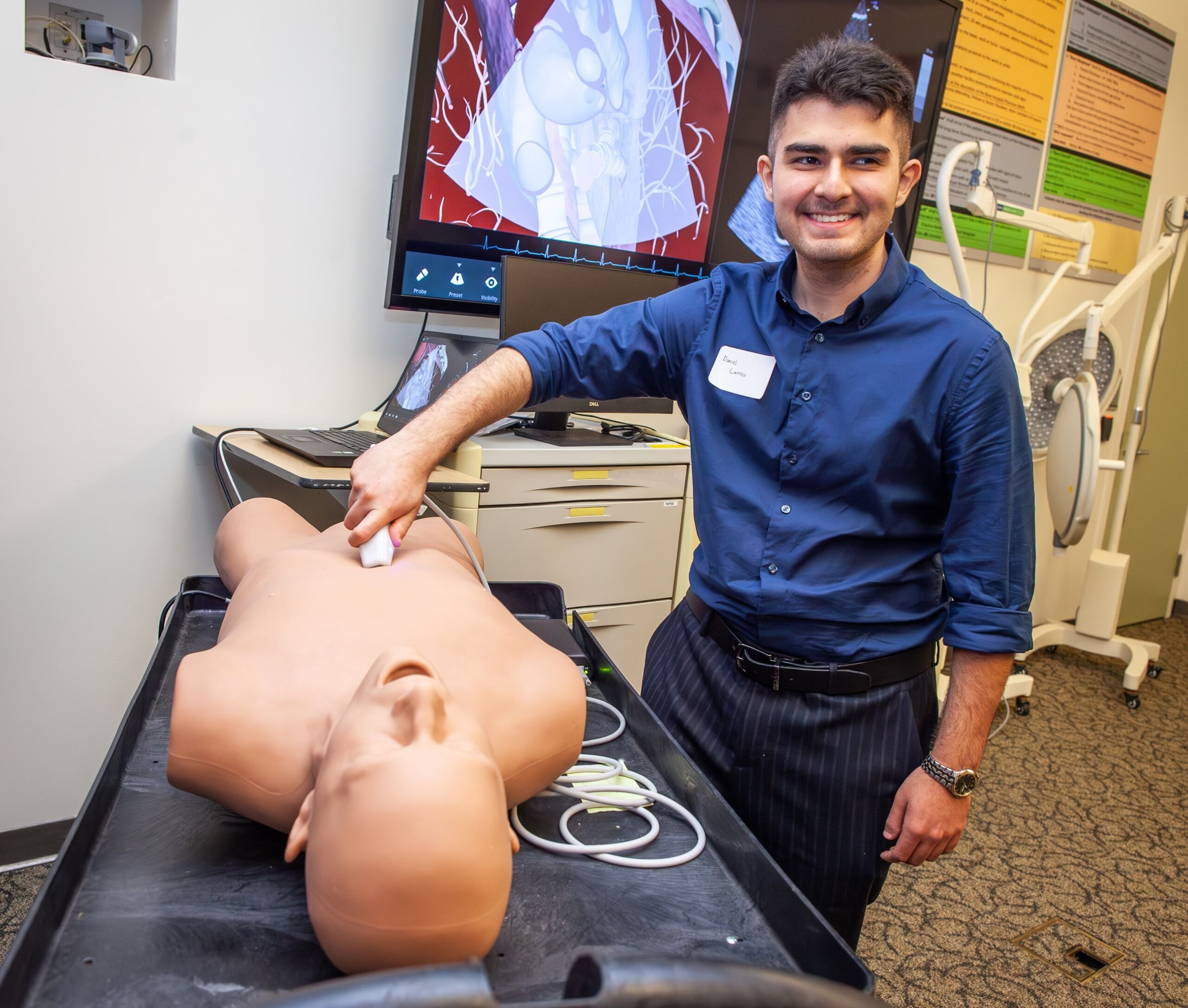
The Fresno Regional Hub within The California Medicine Scholars Program (CMSP) is now accepting applications for its third cohort of students into SJV-MedBridge. SJV-MedBridge currently serves over 100 California community college students from across the San Joaquin Valley who receive tailored support on their path to medical school.
This state-funded effort aims to diversify the primary care physician workforce and respond to looming health workforce shortages. CMSP is a key part of California’s strategy to close a projected shortfall of more than 4,000 primary care physicians by 2030 and address widening disparities in access to care in rural and underserved communities.
UCSF Fresno is the lead institution for the San Joaquin Valley’s Regional Hub of Healthcare Opportunity and is currently accepting applications for its third cohort. The application filing period closes at 11:59 p.m. on Friday, Nov. 1.
Community college students who plan to be enrolled at least part-time during the fall 2024 and spring 2025 semesters are eligible to apply. Applications are available here.
Students accepted into the SJV-MedBridge program benefit from a range of advising, internship, and volunteer health care
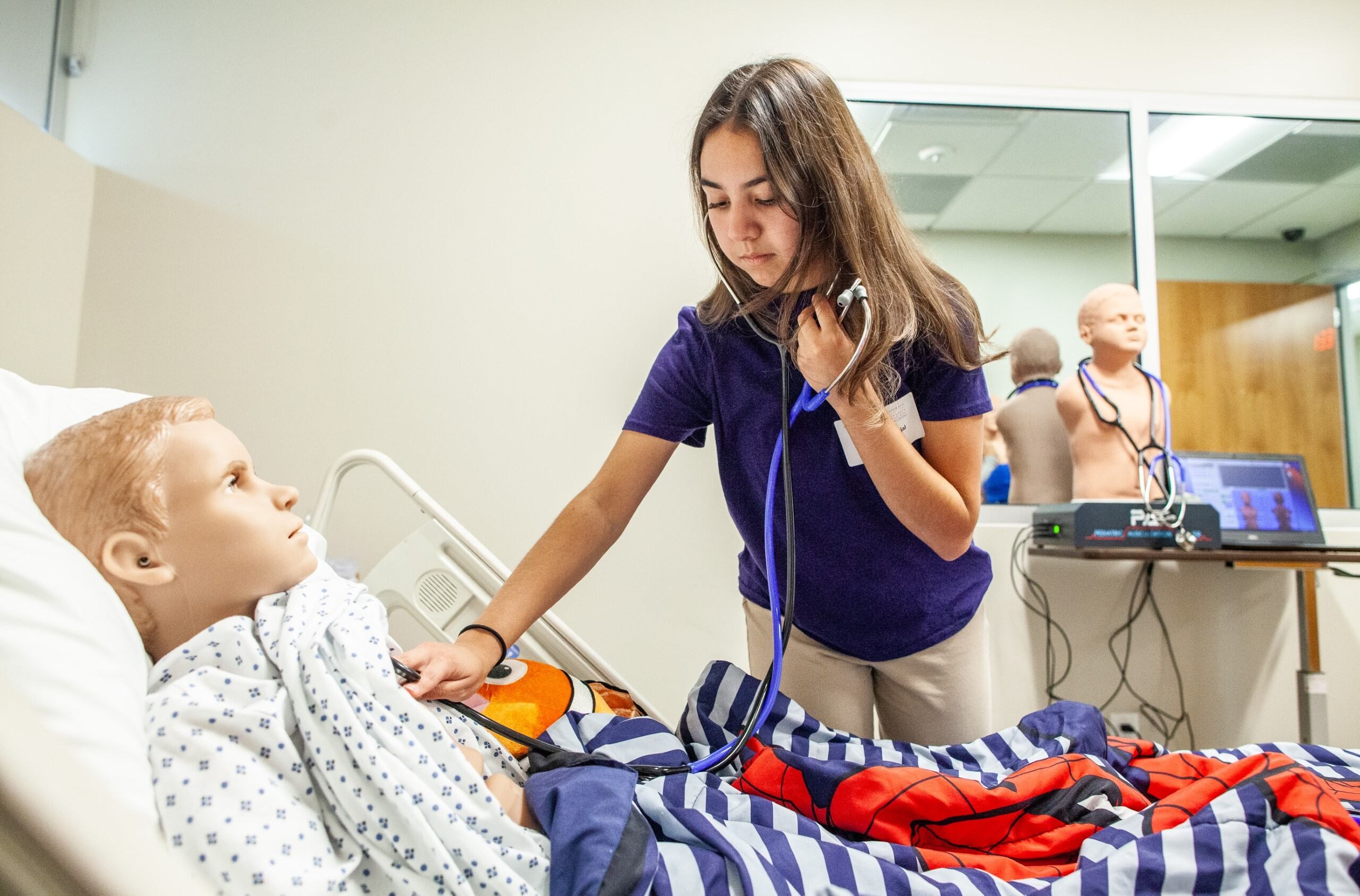
experiences through the CMSP network. This network includes four Regional Hubs of Healthcare Opportunity based on the campuses of the University of California medical schools: UC Davis, UC Riverside, UC San Diego, and UCSF School of Medicine regional campus in Fresno (UCSF Fresno). Scholars also receive support, such as mentoring and networking opportunities with medical professionals and current medical school students.
California Medicine Scholars Program in the San Joaquin Valley
Informational sessions providing a comprehensive look at the program and a walk through of the application will be provided throughout the fall. If you want to join to learn more, watch our website for updates.
Background
Founded in 2017 by a group of dedicated educators and physicians, our program began as a visionary response to bridge the health care gap in California.
In 2021, Senate Bill 40, proposed by Sen. Melissa Hurtado (D-14), paved the way for the establishment of the California Medicine Scholars Program (CMSP). Shortly after, it became a Foundation for California Community Colleges program, where it continues to thrive. The program received a significant boost with $10.5 million in one-time funding allocated in the Governor’s 2021 Budget from the Health and Human Services budget category, administered by the California Department of Health Care Access and Information (HCAI). The 2023-2024 state budget most recently included $2.8 million in ongoing annual funding for program sustainment.
Philanthropic funding from The California Endowment, The California Wellness Foundation, and The California Health Care Foundation also supported the establishment, coordination, and early success of CMSP. Since its official launch in 2022, CMSP has experienced remarkable growth and success, thanks to the unwavering dedication of our staff, regional hubs, community partners, and philanthropic funders. As we plan for further program growth and sustainability, we remain steadfast in our goal to foster a more diverse and representative health care workforce that serves the communities we are deeply committed to.
Today, almost 45% of Californians have insufficient access to a primary care physician, and only 17% of medical students come from underrepresented groups. According to a survey released in February 2023 by the California Health Care Foundation and NORC at the University of Chicago, the majority of Californians (85%) believe that “making sure there are enough doctors, nurses, and other health care providers across California” should be a priority for the state government. Additionally, 42% of Black and Latino/x Californians say their community lacks adequate numbers of primary care providers—along with 53% of San Joaquin Valley residents and 48% of people living in the Inland Empire.
One crucial way to address these gaps is by expanding the number of physicians who match the diversity of the San Joaquin Valley and California. The California Community Colleges — with nearly two million students, 69% of whom are from diverse ethnic backgrounds — is uniquely positioned to improve diversity in the health workforce. CMSP’s four Regional Hubs of Healthcare Opportunity include community colleges, universities, medical schools, community health clinics, and community-based organizations that collaborate to provide greater pre-med opportunities for students. These hubs are led by the following UC medical schools, which provide a bridge between institutions as students advance through the program:
Greater Northern California: Avenue M, led by UC Davis School of Medicine
Inland Empire Regional Hub: California, Medicine Scholars Program, UC Riverside School of Medicine
San Diego: Region X, led by UC San Diego School of Medicine
San Joaquin Valley: SJV MedBridge, Led by UCSF School of Medicine Fresno Regional Campus (UCSF Fresno)
California’s signed state budget for the 2024-2025 fiscal year approved AB107, allocating $2.8 million annually to support the California Medicine Scholars Program (CMSP). This ongoing funding ensures that CMSP's impactful work can continue and expand. Funding from The California Endowment, The California Wellness Foundation, and The California Health Care Foundation also continues to support the program.
To learn more about how California aims to reduce health disparities for communities of color and the critical role the CMSP will play in helping to successfully meet California’s growing population demands, please visit https://californiamedicinescholarsprogram.org/
For more information about the San Joaquin Valley California Medicine Scholars Program, please visit: https://sjvmedbridge.ucsf.edu/

UCSF Fresno’s success and growth are a direct result of the dedication and inspiration of our faculty, staff, residents, fellows, students, alumni, partners, donors and friends. In each issue of Focus on UCSF Fresno, we introduce you to the people who contribute to the greatness of UCSF Fresno.
Antonio Toribio, MD, a UCSF Associate Clinical Professor of Medicine, was born in Mexico and grew up in the San Joaquin Valley laboring alongside his parents in farm fields. The experience helped shape his decision to become a physician and to make his medical career in Fresno.
“I grew up here since I was three and went to school here. Since I was little, I worked in the fields with my parents, then the swap meet and then Burger King,” said Dr. Toribio. “One of the things that my parents always told me was, when you grow up make sure you get a job indoors. That was a big thing for them.”
His parents were always supportive and encouraging, although Dr. Toribio says they didn't really understand the medical field and the pathway to becoming a doctor and as a result, he had to explore the field on his own.
“At a young age, I think I really understood the need that this town has, and I love the town. Growing up, I heard that the number of doctors that we have here is low, so in high school, I started looking into the career as something for me and knew that if I did become a doctor, my plan was to come back here,” said Dr. Toribio.
He graduated from Sanger High School, received his undergraduate degree from Fresno State, and a master’s degree at Texas A&M University. His next goal was medical school. He wanted to become a doctor to help the Hispanic population in a hospital or clinic. He had heard about UCSF Fresno before heading to medical school and knew that’s where he wanted to be.
Dr. Toribio received his medical degree from Loma Linda University School of Medicine. In 2015, he matched to his number one residency program in the Department of Medicine at UCSF Fresno.
“Match day, I was really happy and excited that we were going back home and that everything was coming together finally. As cliché as it sounds, if I did it, you can do it,” said Dr. Toribio.
Dr. Toribio joined the UCSF faculty of UCSF Fresno following residency and is an Associate Assistant Clinical Professor of Medicine specializing in hospital medicine. His interests include medical education, social determinants of health, working with underserved populations, mentoring and outreach to students interested in medicine.
“I think it's very important to give back to the community, and the way I like to give back is through mentoring,” said Dr. Toribio. “If someone could learn through my experiences, that means the world to me because I feel like the more people see their faces in physicians, the easier it is for them to follow that path.”
In the summer of 2024, Dr. Toribio mentored a student from Caruthers High School through the UCSF Fresno Doctors Academy (DA) Summer Health Career Mentorship Program.
He has participated in the summer internship since 2019. Dr. Toribio has also done presentations for the Doctors Academy and Junior Doctors Academy since starting his residency at UCSF Fresno in 2015.
“I really believe that anything that comes your way, any issues, any grades that you didn't get as high as you wanted to, any tests that you didn't pass, there's always a way around that as long as you keep working,” said Dr. Toribio. “I love what I do, and I really like talking to kids that I feel like maybe I walked in their shoes when I was their age and to show them this is where you can be, or even better someday.”
UCSF Fresno was established in 1975 in recognition of the ongoing need to address the physician shortages and pressing health concerns in the San Joaquin Valley. As a regional campus of the UCSF School of Medicine, UCSF Fresno recruits and trains future physicians to address the unique health needs of the region’s diverse and underserved populations. Given the socio-economic challenges in the region, intentional programs are vital to help prepare Valley students for careers in medicine.
To help ensure there are enough highly qualified students available from the region, the UCSF Fresno Office of Health Career Pathways (OHCP) coordinates a variety of programs to help students from middle school through college prepare for careers as physicians and other health care roles. Established in 2022, and directed by Emy Lopez Phillips, EdD, the OHCP partners with local K-12 school districts, community colleges and four-year universities to offer programs that inspire and prepare Valley students for educational success and exploration of research and health careers. Student participants benefit from support systems that include enhanced curriculum, tailored advising, mentoring and other resources critical to their success.
“The young people in our Valley are full of hope and resilience. Many have a strong desire to give back to their communities,” said Dr. Lopez Phillips. “This is an exciting time as we at UCSF Fresno along with our partners have an opportunity to help lift and mentor the next generation.”
The following health career pathway programs are coordinated through the OHCP. While these programs are separate and distinct, they provide a seamless pathway for academic preparation and enrichment, preparing Valley students for entry into careers in medicine.
- San Joaquin Valley (SJV) – MedBridge supports community college students interested in becoming physicians.
- Doctors Academy serves middle school and high school students to help them prepare for college while learning about careers in health and medicine.
- Mini Med School gives high school and college students — as well as community members — the opportunity to learn about local trends in medicine and health sciences from faculty, residents, fellows and medical students at UCSF Fresno.
- Reaching Out to Aspiring Doctors (ROAD) Conference serves both pre-health students and educators from regional high schools, community colleges and four-year universities by providing resources for pursuing careers in health and medicine.
- Youth Mental Health First Aid Training equips college students and community members with knowledge and skills to identify, understand, and respond to mental health and substance use challenges in adolescents.
- Raices (Roots) in the San Joaquin Valley, a grant-funded initiative by the Fresno-Madera K-16 Collaborative Project, enhances educational and technical support in health pathways to improve the student experience and create new opportunities for their success.
- SJV Mentoring to Medicine enhances the development of aspiring health professionals with roots in the San Joaquin Valley through mentorship and community engagement during the summer.
In addition to OHCP-managed programs, UCSF Fresno also offers the following pathways:
- Summer Biomedical Internship Program (SBI) matches high school students with faculty members to engage in research projects that enhance their understanding of biomedical sciences.
- Pre-Medical Surgical Internship Program helps prepare undergraduate pre-medical students from disadvantaged backgrounds to successfully enter medical school.
UCSF Fresno relies on grant funding and private donations to coordinate and maintain these impactful pathway programs. Additional support is needed to ensure their growth and sustainability. We invite you to join us in investing in the future of health care for the San Joaquin Valley. With a gift to the UCSF Fresno Office of Health Career Pathways, you become an essential partner in cultivating the next generation of health care leaders from diverse backgrounds who have the skills and passion to care for our region’s underserved communities.
For more information on how you can influence the future of medical education and health care in the San Joaquin Valley, please contact Kathleen Smith, UCSF Fresno associate director of development, at 559-499-6426 or [email protected].
Kudos: UCSF Fresno Recognition (Fall 2024)
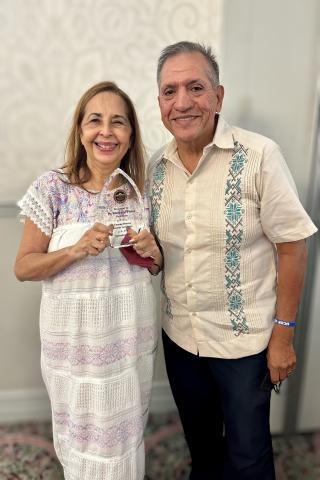
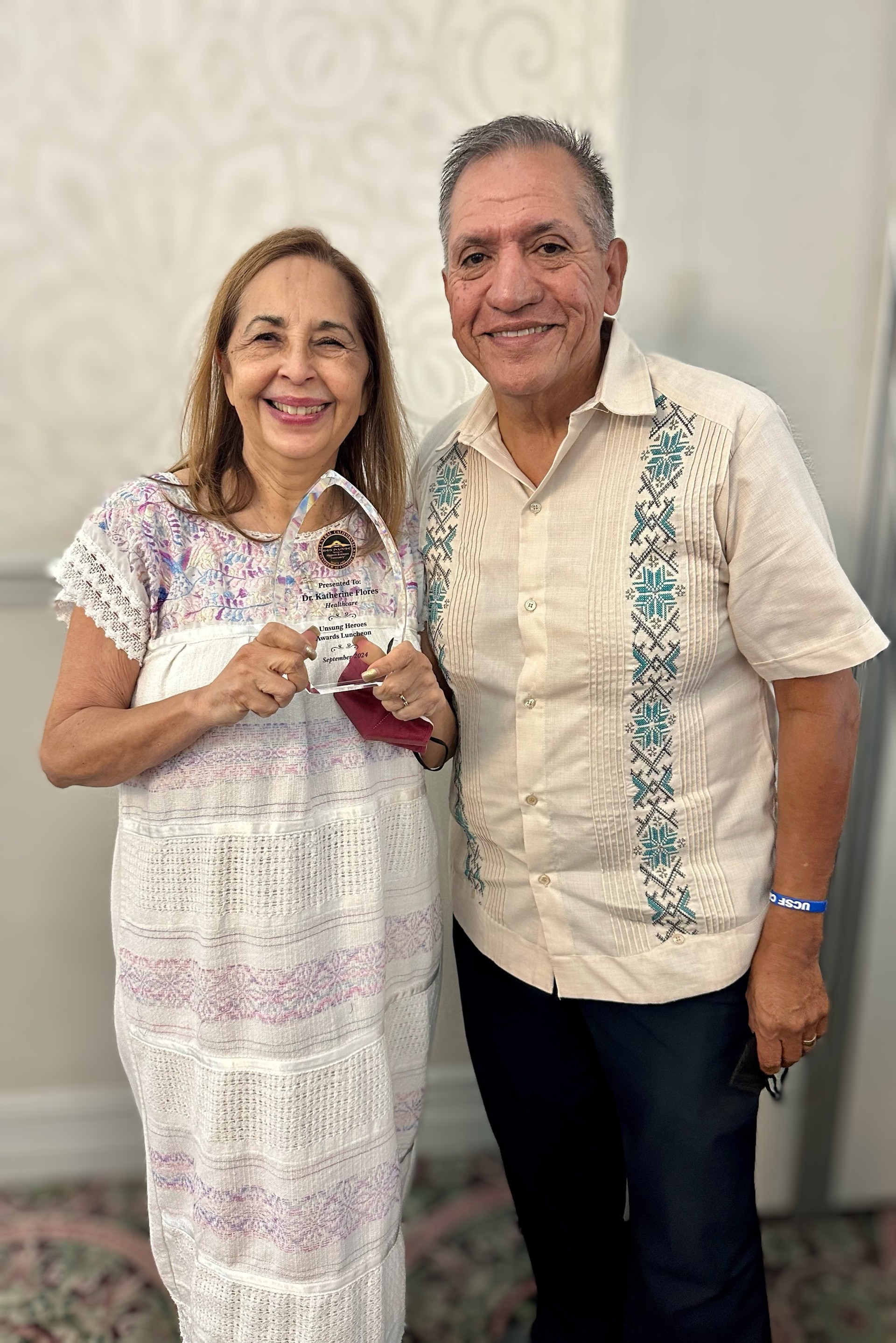
Kudos to Katherine A. Flores, MD, UCSF Fresno Family and Community Medicine, for receiving an Unsung Heroes Award from the Central California Hispanic Chamber of Commerce for her pioneering work in developing pathway programs to inspire and academically prepare students for careers in health and medicine.

Congratulations to the UCSF Fresno Department of Emergency Medicine Residency Program on its 50th anniversary. Visionary physicians recognized the need for dedicated emergency care and established one of the first Emergency Medicine programs in the United States in 1974 at UCSF Fresno.
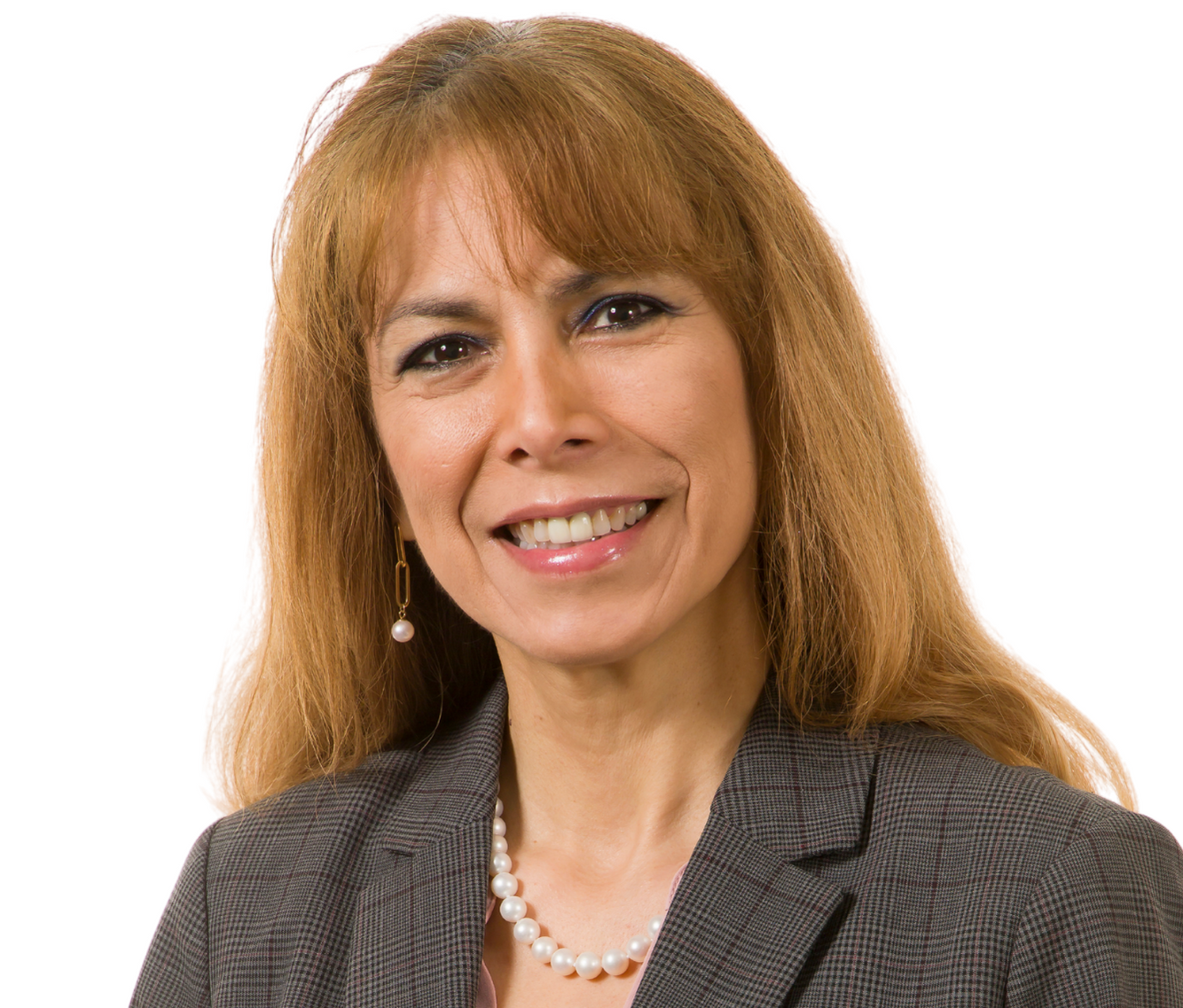
Congratulations to Lourdes DelRosso, MD, PhD, UCSF Fresno Family and Community Medicine and medical director, Inspire Health Sleep Medicine, for being part of the task force that created important guidelines for treating Restless Leg Syndrome. The guidelines were recently published in the Journal of Clinical Sleep Medicine and the National Library of Medicine National Center for Biotechnology Information.

Congratulations to Joseph Sanford, MD, UCSF Department of Neurology and Geetha Sivasubramanian, MD, FIDSA, UCSF Fresno Department of Medicine, Division of Infectious Diseases, for being inducted into the Haile T. Debas Academy of Medical Educators Class of 2024.
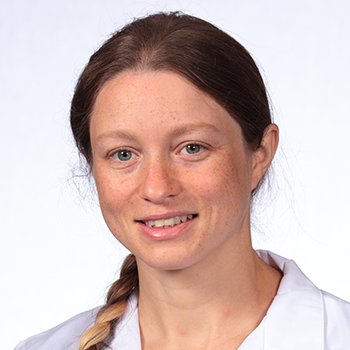
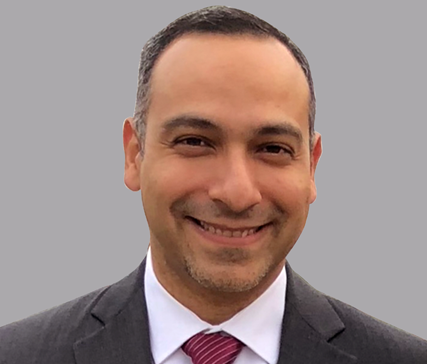
Congratulations to Elizabeth Black, MD, Pediatrics, and Mohamed Fayed, MD, Medicine, for receiving 2024 Academy of Medical Educators Excellence in Teaching Awards
Kudos to Sujay Dayal, DO, Nam Huynh, MD, both third-year Internal Medicine residents, and Lourdes DelRosso, MD, PhD, for publication of their study “Is consuming red meat associated with obstructive sleep apnea? A systematic review.”
Kudos to Jennifer Camacho, Information Technology, for recently earning a Professional Certificate in Machine and Learning & Artificial Intelligence from UC Berkeley Executive Education.
Kudos to Virginia Coningsby, UCSF Fresno Department of Emergency Medicine, for successfully completing the requirements for recertification in Graduate Medical Education Training Administration (C-TAGME).
Congratulations to UCSF Fresno’s Stephanie Covacevich, Undergraduate Medical Education, and Sydney Farnesi, Office of Health Career Pathways, for being among the 2024 STAR Achievement Award recipients to date.
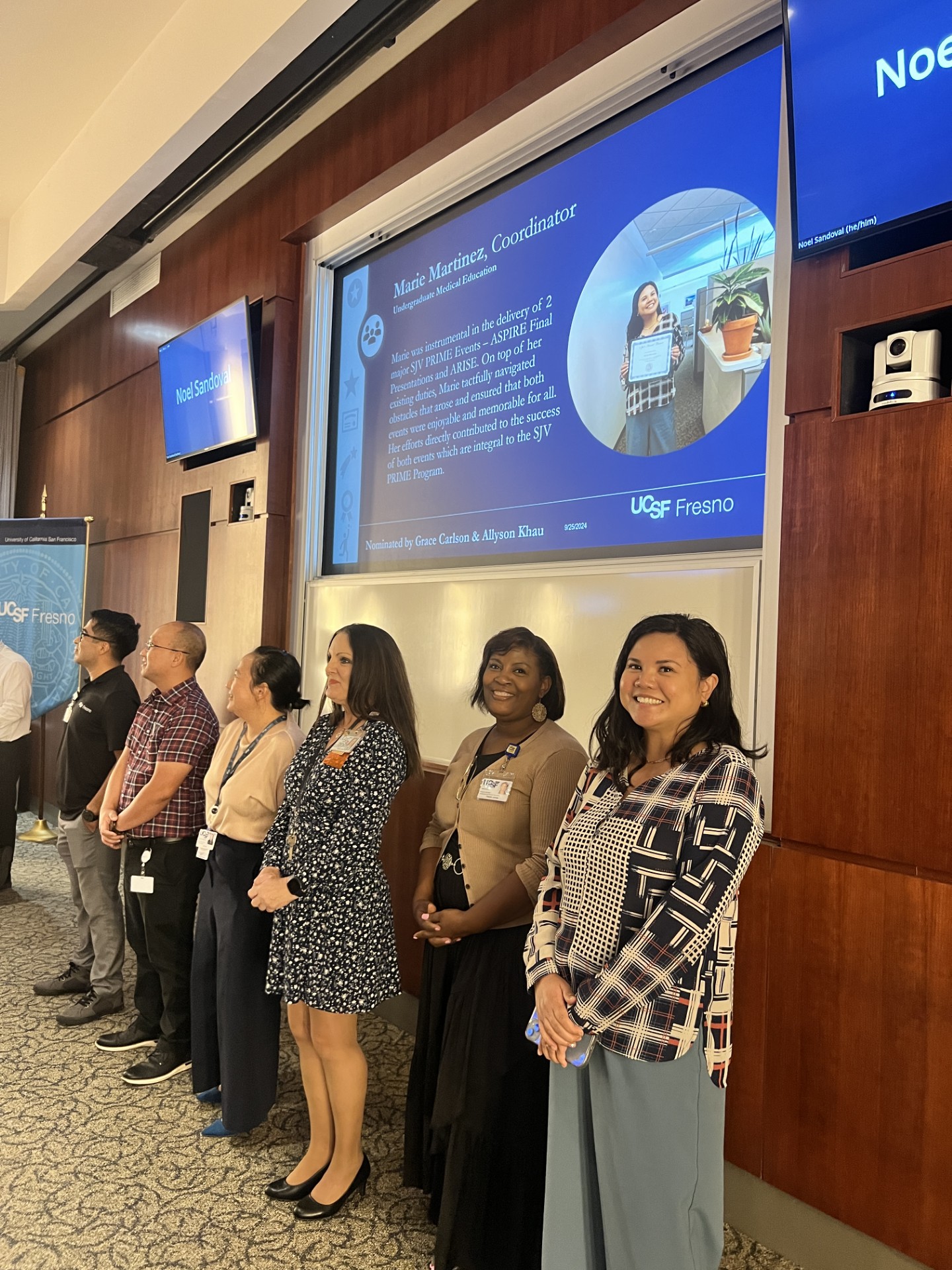
Kudos to the following UCSF Fresno staff for recently receiving Spot Awards: Ka Her, Department of Medicine; Stephanie Huerta-Alvarez, Office of Health Career Pathways; Kasan Jones, Interim Director of Administration; Marie Martinez, Undergraduate Medical Education; Rebecca Miller, Department of Surgery; Brandy Ramos Nikaido, Public Affairs, Communications and Government Relations; Jesus Pimentel, Department of Pediatrics; Alex Reyes, Campus Life Services; Denise Wells, Risk Management; Fue Xiong, Campus Life Services.
Congratulations to Eric Acuna for receiving a UCSF Facilities Services Spot Award for July 2024.

